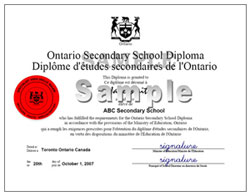Specialist High Skills Major (SHSM): policy and implementation guide
This guide outlines the policy for the Specialist High Skills Major (SHSM) program. It includes information and resources to help you plan and implement the program at your school.
This guide is for educators and school board staff.
Parents and students
Learn more about the Specialist High Skills Major (SHSM) at ontario.ca/SHSM.
Introduction to the SHSM guide
The Specialist High Skills Major Policy and Implementation Guide outlines the policy for the Specialist High Skills Major (SHSM) program. It includes information on how to plan and implement an SHSM program and provides useful resources. The guide is based on Ministry of Education policy and the experience of educators across the province.
To get started:
- Read the planning and implementation overview. This will help you understand the rest of the guide.
- Familiarize yourself with key terminology used when developing and implementing an SHSM program.
- Find information about supporting students with special education needs in the SHSM.
About the Specialist High Skills Major (SHSM) program
The SHSM is a specialized high school program that lets students:
- focus on a career path in one of 19 different sectors
- matches their skills and interests
- meet the requirements of the Ontario Secondary School Diploma (OSSD)
This program also lets students:
- customize their high school education to suit their interests and talents
- gain hands-on experience in their chosen sector through cooperative education
- develop specific knowledge and skills that colleges, universities and employers value
- earn credits that employers and postsecondary education institutions recognize
- gain sector-specific and career-relevant certification and training
- engage in sector-partnered experiences to gain relevant experience in their chosen sector
- identify, explore and refine their career goals
- make informed decisions about their postsecondary destination
- remain flexible, with the option to shift between postsecondary destination pathways if their goals and plans change
When students complete an SHSM, they get:
- a high school diploma with an embossed SHSM seal
- an SHSM record with details of their bundle of credits, certifications, placements and other experiences
- formal recognition on their Ontario Student Transcript
Components of the SHSM program
This section explains the policy and requirements that all SHSM programs must follow:
- bundle of credits
- certification and training experiences
- experiential learning and career exploration
- reach ahead experiences
- sector-partnered experiences (SPEs)
Learn about the components of the SHSM.
SHSM sectors
Each SHSM sector offers many career options. You'll find examples of occupations sorted by the type of postsecondary education or training usually needed.
Learn about the many SHSM program sectors.
Search our list of SHSM programs by sector offered for the current school year.
Planning and implementation
Learn how to organize, plan and implement an SHSM program while considering your school’s local context. Get information about:
- documenting student progress
- school SHSM teams and partnerships
- planning for an SHSM
- implementing an SHSM at your school
- program evaluation
- adapting an SHSM for students with special education needs
Learn about SHSM planning and implementation.
Resources
Here are some of tools and resources that you can use when implementing an SHSM program.
Checklists
Use these checklists to support SHSM planning and implementation:
- planning and delivering a Sector-Partnered Experience (SPE)
- responsibilities of board SHSM leads and school teams
- implementation checklist for school principals
Education resources
SHSM e-Community is a password-protected site that provides educators with opportunities to share resources, including those specifically developed to support SHSM programs.
Workplace safety policy
Read our policy for Workplace Safety and Insurance Coverage for Students in Work Education Programs.
Visual identity resources
To create marketing materials to promote your board’s specific SHSM programs, school boards must follow the visual identity guidelines provided by the Ministry of Education.
Download each graphics file you need:
- Greyscale – EPS
- Greyscale – JPG
- White – EPS (reverse version)
- Black – EPS
- Black – JPG
- CMYK – JPG
- Pantone – EPS
Share your feedback
We welcome your comments and suggestions.
Email us at skillsdevelopmentandapprenticeshipbranch@ontario.ca to share your feedback and ideas.
We will provide updates so that you always have the most current information as the SHSM program continues to evolve and grow.
